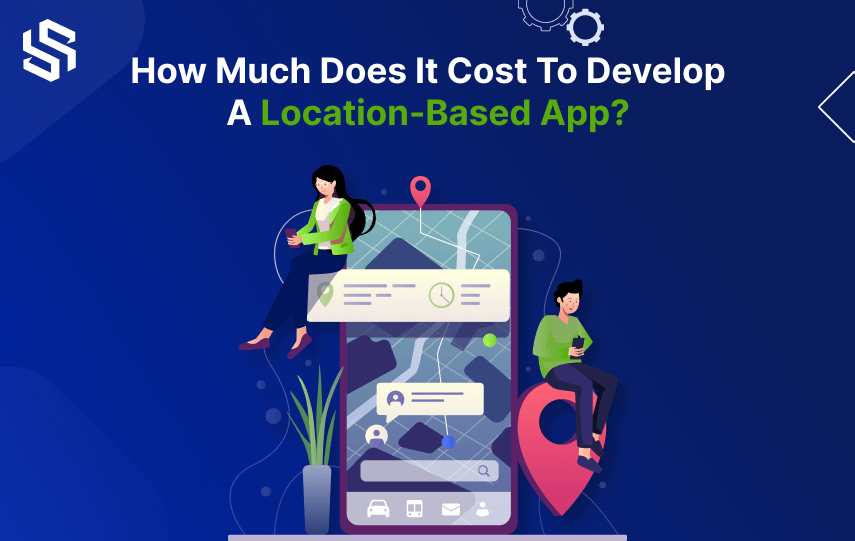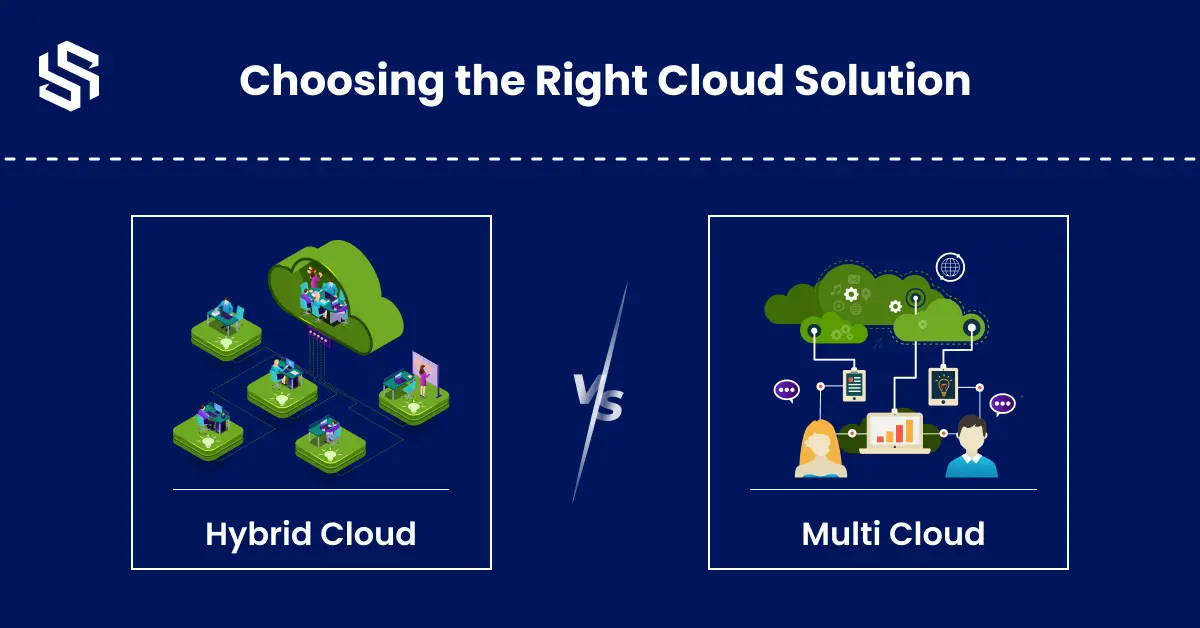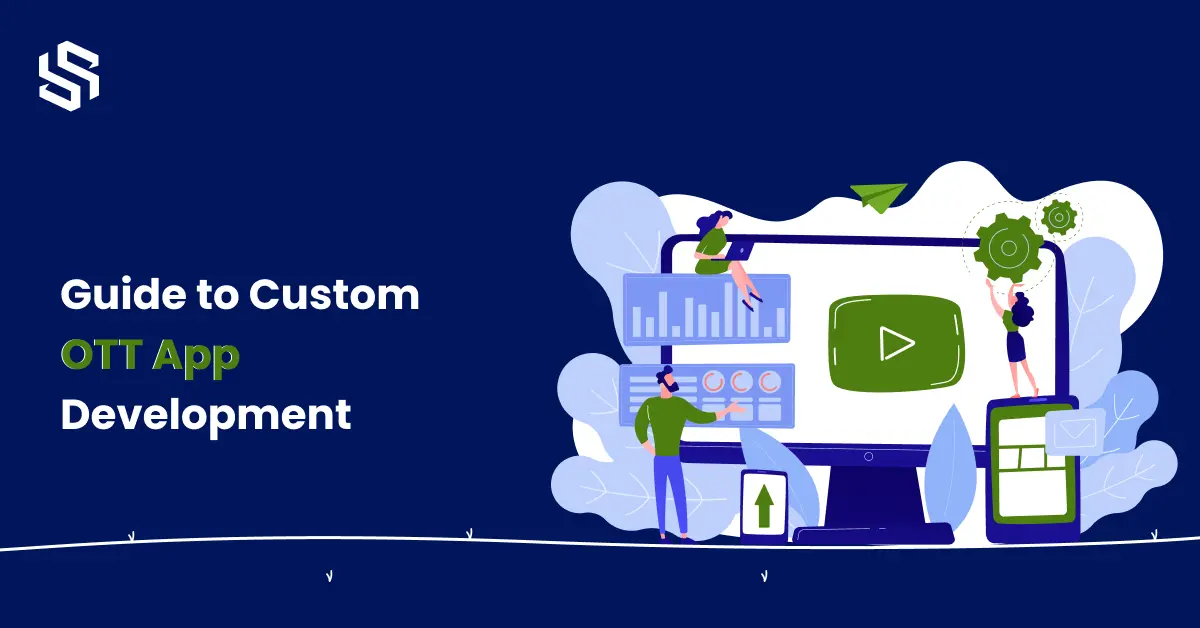Introduction
A location-based app is a software application that uses the user’s geographic location to provide personalized content or services. These types of apps can be developed for a variety of purposes, such as providing directions, displaying nearby points of interest, or enabling location-based social networking.
There are several tools and platforms available for location based app development, including geolocation app builders and Map Based App Development platforms. These tools often provide pre-built templates, libraries, and other resources to make it easier for developers to create location-based apps.
To develop a location-based app, a developer will typically start by identifying the problem or need that the app will solve, and then determining how location data will be used to address this problem. They may then use a combination of geolocation and mapping APIs, along with other technologies such as GPS, Bluetooth, and Wi-Fi, to enable location tracking and mapping functionality in the app.
It’s important to note that location-based apps raise privacy concerns, as they often collect and use sensitive location data. Developers should be aware of these issues and take steps to protect user privacy, such as obtaining explicit consent and implementing secure data storage and transmission practices.
How Does Location Based App Work?
Location-based apps use GPS, cell tower triangulation, and other technologies to determine the device’s physical location. This information is then used to provide location-specific services or content to the user.
When a user opens a location-based app, the app will typically ask for permission to access the device’s location information. If the user grants permission, the app can then use the device’s GPS or other location-sensing technology to determine the device’s location.
Once the app has the device’s location, it can then use this information to provide location-specific services or content. For example, a location-based weather app might use the device’s location to provide the current weather conditions and forecast for the user’s current location. A location-based social networking app might use the device’s location to show the user to nearby friends or events.
Location-based apps can also use location information to provide targeted advertising. For example, a location-based retail app might use the device’s location to show the user coupons or discounts for nearby stores.
Overall, location-based apps use location information to provide a more personalized and relevant experience for the user.
Key Features of Location-based Apps
Here are some of the key features of location-based services or map-based services apps:
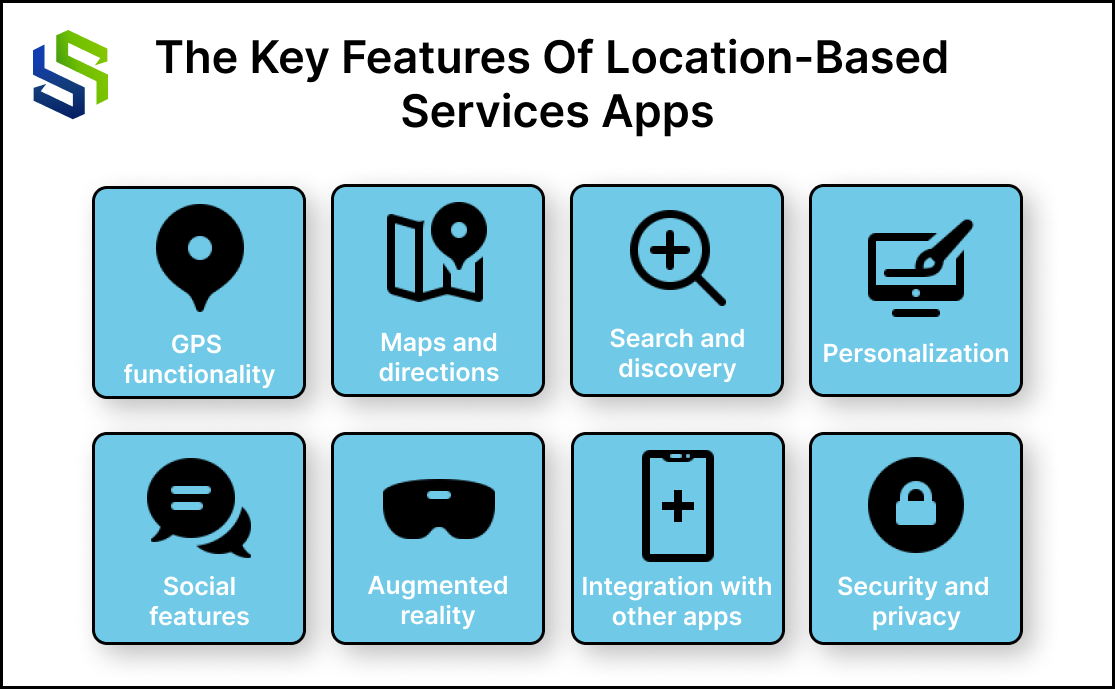
1. GPS Functionality:
Location-based app development often includes the use of GPS functionality, which allows the app to determine the user’s current location and provide location-based information and services. A geolocation app builder can be used to incorporate GPS functionality into an app.
2. Maps And Directions:
Many location-based service apps include maps and directions to help users navigate to their desired location. Map based app development can be used to create these features.
3. Search And Discovery:
These apps often allow users to search for and discover nearby businesses, restaurants, and other points of interest. A location based mobile app development team may focus on creating search and discovery functionality for the app.
Have a unique project idea in your mind?
4. Personalization:
Many location-based services app allow users to customize their experience by providing recommendations based on their location, interests, and past behavior. Geolocation app development may include the creation of personalization features.
5. Social Features:
Some location-based services app include social features that allow users to connect with friends and share their location or experiences with others. These features can be created using location based mobile app development techniques.
6. Augmented Reality:
Some apps use augmented reality technology to provide location-based information and experiences in a more immersive way. This can be achieved through the use of location-based app development and geolocation app development techniques.
7. Integration With Other Apps:
Many location-based service apps integrate with other apps and services, such as ride-hailing apps or food delivery services, to provide a seamless user experience. Location-based mobile app development may include the creation of integrations with other apps and services.
8. Security And Privacy:
It is important for location-based service apps to prioritize the security and privacy of their users, especially when it comes to collecting and using location data. This can be achieved through the use of location-based app development and geolocation app development techniques that prioritize security and privacy.
Why Do Apps Use Geolocation?
Location based app development has become increasingly popular in recent years. Apps that use geolocation have become a staple of the modern mobile experience. With geolocation, an app can detect the user’s location in order to provide relevant information and services.
Geolocation is used by many different types of apps, from online retailers to navigation apps to social media. Geolocation can be used to personalize the user experience, increase engagement, and drive sales.
Here are some of the key reasons why apps use geolocation technology:
Target Audience:
By using geolocation, app developers can better target users based on their location. This can help them make sure their app is being seen by the right people.
Location-Based Services:
Geolocation can be used to offer location-based services. For example, a restaurant app can offer directions to a restaurant, or a travel app can offer recommendations on nearby attractions.
Personalization:
By understanding a user’s location, apps can personalize the user experience, such as displaying local news or offering local discounts.
Increased Engagement:
By providing users with relevant content based on their location, apps can increase engagement, leading to more downloads and usage.
Location-Based Advertising:
Geolocation can be used to target ads based on a user’s location, which can be more effective than traditional online ads.
Overall, geolocation is an important tool for app developers. By understanding a user’s location, apps can provide more personalized experiences, increase engagement, and drive sales. Geolocation technology is a powerful tool for app developers, and with the right geolocation app builder, they can easily create powerful, location-based apps.
Benefits of Location-Based Application development for Businesses
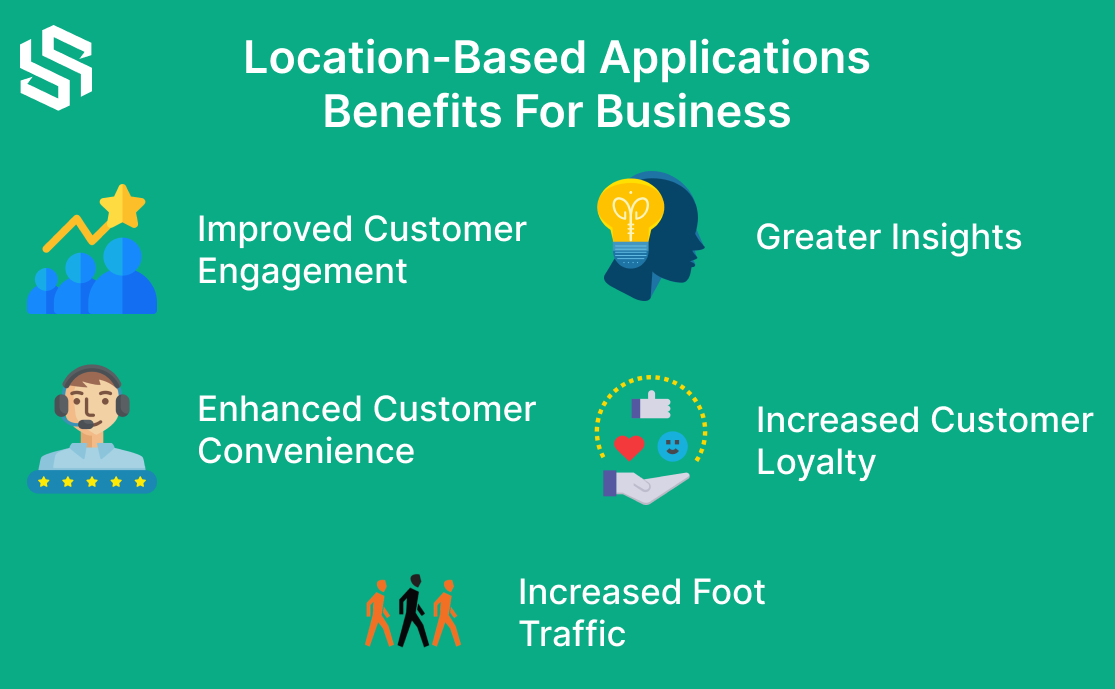
There are several benefits of creating location-based applications for businesses:
Improved Customer Engagement:
Location-based apps can be used to send personalized notifications and offers to customers based on their location. This can help businesses improve customer engagement and increase sales.
Enhanced Customer Convenience:
Location-based apps can help customers find businesses and products easily. For example, a restaurant app can help customers find the nearest restaurant, while a retail app can help customers find a store that carries a specific product.
Increased Foot Traffic:
By offering location-based promotions and discounts, businesses can encourage customers to visit their store or location.
Greater Lnsights:
Location-based apps can provide businesses with valuable insights into customer behavior and preferences. For example, a retail business can use location data to understand customer foot traffic patterns and optimize its store layout.
Increased Customer Loyalty:
By offering personalized experiences and rewards, businesses can build customer loyalty and encourage repeat business.
Overall, location-based apps can help businesses improve customer engagement, convenience, and loyalty, and provide valuable insights into customer behavior.
Technologies That Support Geolocation Features
Geolocation technologies have become increasingly important in recent years, with the rise of location-based services and applications. These technologies allow businesses and organizations to provide location-specific information and services to their customers or employees, and have become an integral part of the software development industry.
Location based app development has become particularly popular, with many companies and organizations turning to geolocation technology to create innovative and functional apps that rely on a user’s location.
Technologies that support geolocation features are technologies that allow for the tracking and mapping of a user’s location. These technologies are used in a variety of applications, including navigation, location-based advertising, and location-based search.
Some examples of technologies that support geolocation features include:
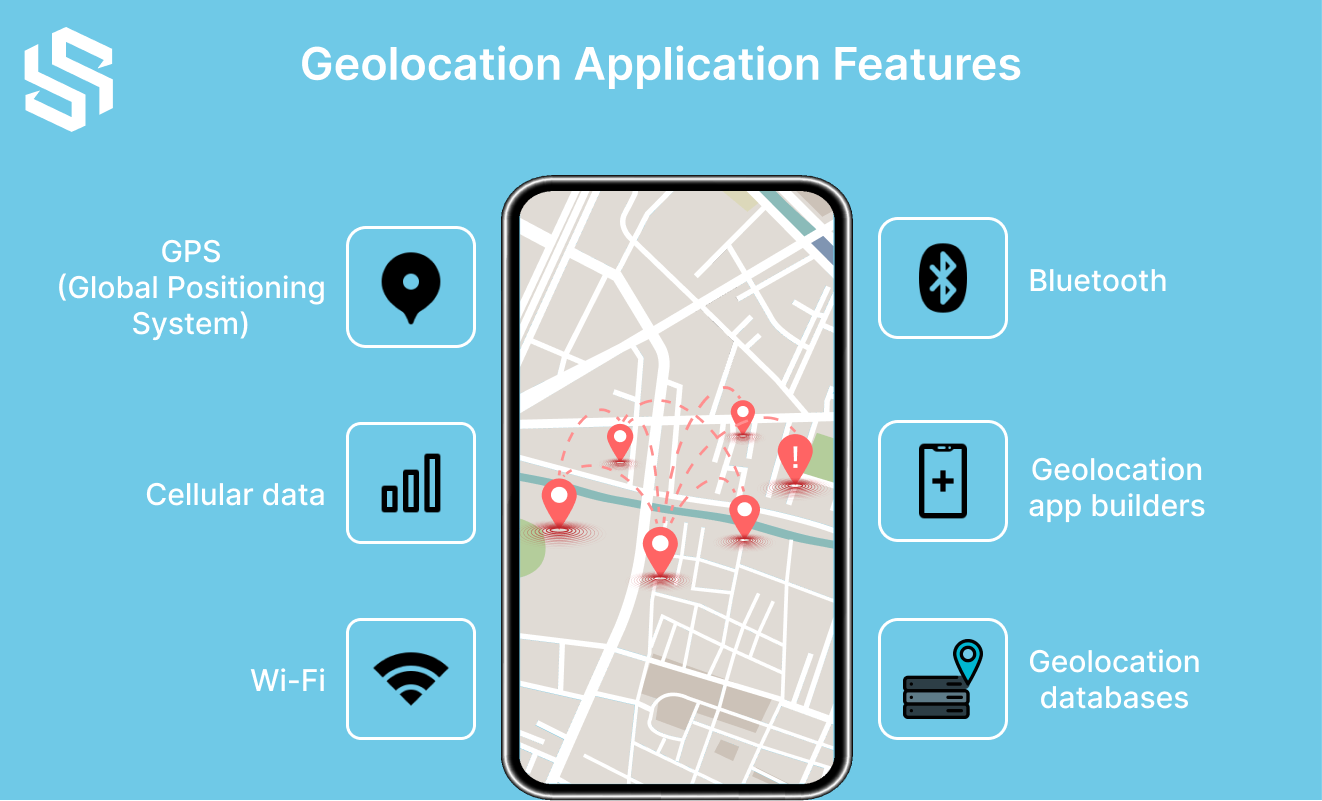
GPS (Global Positioning System)
This satellite-based system uses a network of orbiting satellites to determine a user’s location. GPS is highly accurate and widely used in a variety of applications, including navigation and location-based advertising.
Cellular Data
Many devices, such as smartphones, use cellular data to determine a user’s location by triangulating their position based on the signal strength of nearby cell towers.
Wi-Fi
Some devices, such as laptops and tablets, can use Wi-Fi to determine a user’s location by detecting nearby Wi-Fi networks and their associated locations.
Bluetooth
Bluetooth is a short-range wireless technology used for geolocation as well. It works by leveraging the signals of nearby Bluetooth-enabled devices, such as smartphones and smartwatches, to determine a user’s location. This technology is especially useful for indoor locations, where GPS and cellular networks may not be available.
Geolocation App Builders
Geolocation Databases
These databases contain a list of known locations and their associated coordinates, which can be used to determine a user’s location. This technology relies on a user’s device being connected to the internet to access the database and determine their location.
How to Create a Location-Based App - 6 Steps
As you inquired about the various types of GPS applications and how to develop one technically, as well as the associated cost, you are now prepared to commence creating your own location-based application.
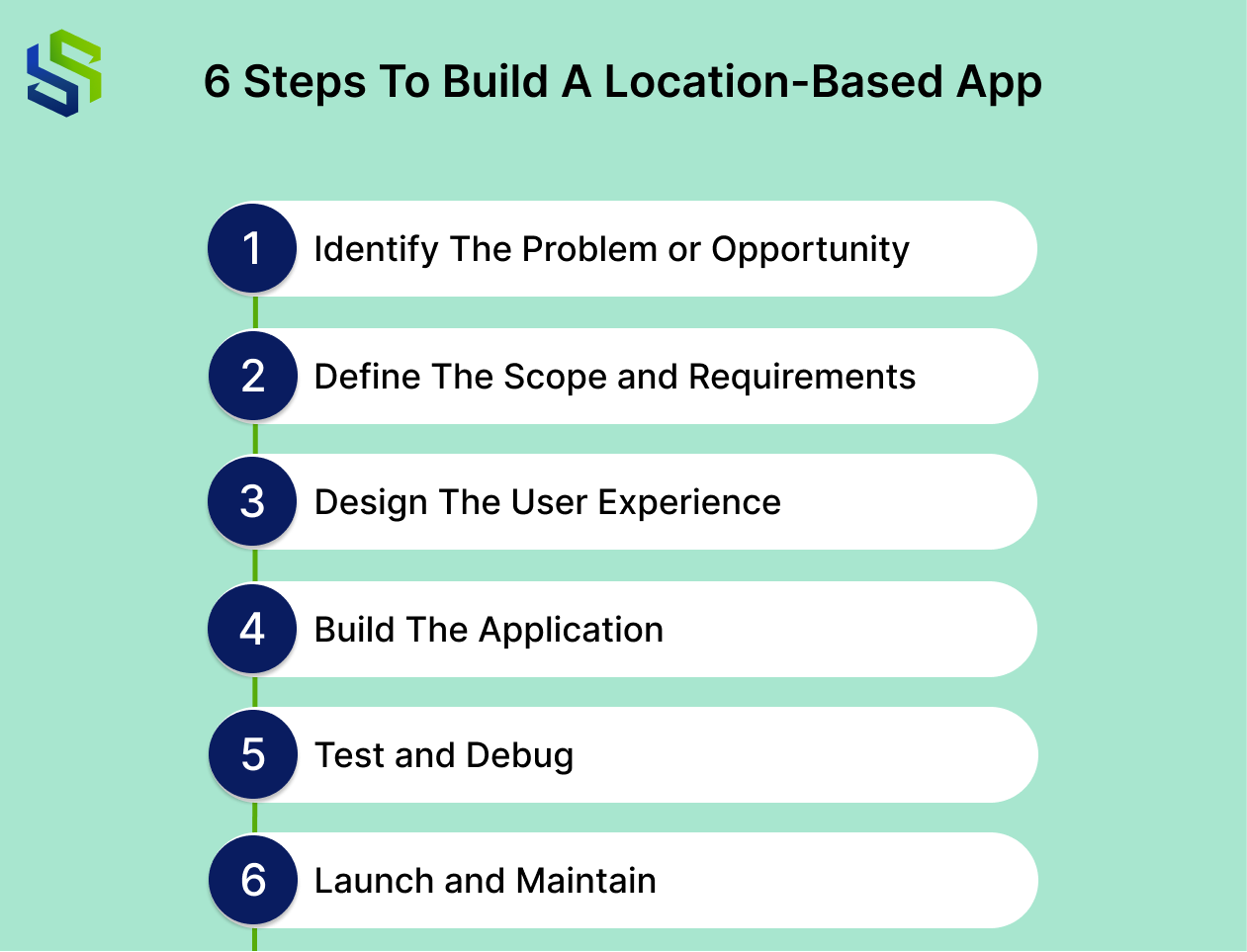
Here is a concise overview of the development process for such an app, encompassing all the required steps to deliver a successful mobile app.
Step 1: Identify The Problem or Opportunity
The first step in developing a location-based application is to identify the problem or opportunity that the application will address. This might involve conducting market research, gathering customer feedback, or identifying a gap in the current offerings in the market.
Step 2: Define The Scope And Requirements
Once the problem or opportunity has been identified, the next step is to define the scope and requirements of the application. This includes determining the target audience, identifying the key features and functionality that the application will offer, and estabestablishing any performance or security requirements.
Step 3: Design The User Experience
The user experience (UX) design phase involves creating wireframes, prototypes, and user flows to visualize and test the application’s interface and navigation. This step helps to ensure that the application is intuitive and easy to use for the target audience.
Step 4: Build The Application
The development phase involves writing the code and building the application using software development tools and frameworks. This might include implementing features such as location tracking, mapping, and real-time data updates.
Step 5: Test And Debug
Once the application is built, it is important to thoroughly test and debug it to ensure that it is reliable and performs as intended. This might involve running automated tests, conducting user testing, and fixing any issues that are identified.
Step 6: Launch And Maintain
Once the application is tested and debugged, it is ready to be launched. Ongoing maintenance is also an important aspect of the application development process, as it involves fixing any issues that arise and adding new features and functionality to keep the application up to date.
Want To Develop A Location-Based App?
Get in touch with syndell for the Location-Based App Development.
How Much Does It Cost To Develop A Location-Based App
The cost of developing a location-based app can vary significantly depending on a number of factors, including the complexity of the app, the number of features and functionality it includes the development team’s expertise and experience, and the tools and technologies used to build the app. It is important to work with a software development company to get a detailed quote based on your specific requirements.
Some of the factors that can influence the cost of developing a location-based app include:
Geolocation Technology:
The complexity and accuracy of the geolocation technology used in the app can impact the overall cost. For example, using GPS or other high-precision location services can be more expensive than using less accurate technologies such as cell tower triangulation or Wi-Fi-based location tracking.
Mapping:
Incorporating mapping functionality, such as real-time traffic updates or 3D visualization, can also increase the cost of developing a location-based app.
Custom Features:
The more custom features and functionality the app includes, the more expensive it will be to develop. This might include things like personalized recommendations, social media integration, or real-time data updates.
Platform:
The cost of developing a location-based app can also vary depending on the platform it is being built for, with some platforms requiring more resources and expertise to develop for than others.
The cost of developing a location-based app can vary widely depending on a number of factors, including the complexity of the app, the number of features it includes, the development platform and tools used, and the expertise and experience of the development team.
However, some rough estimates for the cost of developing a location-based app could range from $10,000 to $500,000 or more, depending on the complexity and scope of the project.
Location-based apps are increasingly popular, with a growing number of users turning to these types of apps for a wide range of purposes.
Did You Know?
According to a recent study, the global location-based services market is expected to grow at a compound annual growth rate of 18.6% between 2021 and 2026, reaching a market size of $131.55 billion by 2026.
Additionally, the use of location-based services is expected to continue to rise as more people adopt smartphones and other mobile devices, and as the technology behind location-based services improves.
You can now hire an Android app developer or a location based app development company like ours to build map-based apps for both Android and iOS devices.
Types Of Location-based Apps
Navigation Apps:
Navigation apps use GPS technology to provide directions and help users navigate to a specific location.
Social Networking Apps:
Social networking apps use location data to connect users with others in the same location or area.
Local Search Apps:
Local search apps allow users to search for businesses or services in their local area.
Travel Apps:
Geolocation-based travel applications provide information and recommendations for travelers, including things to do and places to stay in a particular location.
Geofencing Apps:
Geofencing apps use GPS technology to create virtual boundaries around a specific location, and can trigger alerts or notifications when a user enters or leaves the designated area.
Gaming Apps:
Gaming apps use location data to create augmented reality games or other location-based gameplay experiences.
Fitness Apps:
Fitness apps track users’ workouts and use location data to provide information about routes, distance traveled, and other fitness metrics.
Event Apps:
Event apps provide information about events and activities happening in a specific location.
Weather Apps:
Weather apps use location data to provide local weather forecasts and alerts.
Conclusion
Location-Based Application Development involves creating apps that utilize a user’s location to provide relevant and personalized information. These types of apps often have features such as location tracking, map integration, and push notifications. The development cost for a location-based app can vary based on the complexity of the features and the platform on which it is being developed. However, the benefits of a location-based app can be significant, including increased customer engagement and convenience, improved customer service, and increased revenue through targeted advertising and location-specific offers. It is important to carefully consider your goals and budget when developing a location-based application.
We are a top mobile app development company and software development company; you can connect with us and hire our software developer team, which has expertise in app development.
FAQs
Location-based app development involves creating apps that utilize a user’s location to provide relevant and personalized information, while traditional app development does not necessarily have this focus.
A location-based app should be developed for the platforms that are most commonly used by the target audience, such as iOS and Android for mobile devices and web browsers for desktop computers. It may also be beneficial to develop for other platforms, such as wearables, depending on the goals and target audience of the app.
When choosing a software development team for your location-based app, it is important to consider their experience and track record in developing similar apps, as well as their availability and communication skills. It is also a good idea to get quotes from multiple teams to compare costs and ensure you are getting the best value for your budget.
Location-based apps can improve customer engagement and loyalty by providing personalized and relevant content, offers, and experiences based on the user’s location and previous interactions with the app.
The development challenges of developing location-based apps include obtaining accurate and reliable location data, designing an intuitive and easy-to-use user interface, and ensuring that the app is performant and works seamlessly on a variety of devices and operating systems.


